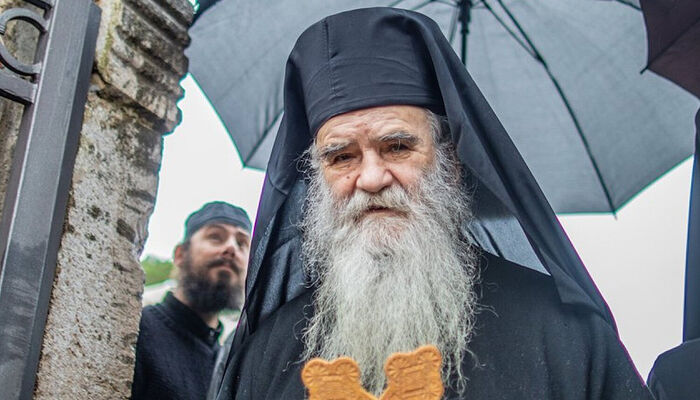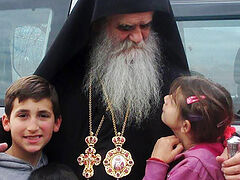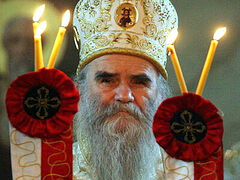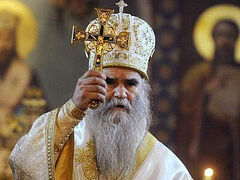On October 30, 2022, the second anniversary of the repose of Metropolitan Amfilohije (Radovic), an ascetic of our days who raised peoples to defend Orthodoxy, his successor, Metropolitan Joanikije (Micovic) of Montenegro and the Littoral, spoke about his predecessor at the evening dedicated to Vladyka Amfilohije at the end of the “Serbian Consolation to the Russian Heart” international festival in Moscow.
 Metropolitan Amfilohije (Radovic)
Metropolitan Amfilohije (Radovic)
The ever-rememorable Metropolitan Amfilohije was endowed with many gifts and talents, and he did not waste them, but developed them throughout his life. He was a tireless worker and an extremely interesting personality. He received an excellent education. But with all his immense knowledge, he was adorned with profound prayerfulness, complete humility and a sensitivity to the Creator. He lived a very intense spiritual life, constantly undertaking something, adjusting his soul in accordance with the Gospel. In his communication with people he was open and approachable, sharing all his inner wealth with them. He consoled a wide range of people: families, monastics, professors and scientists, simple hard workers, wise old people with long life experience, and young people.
On returning from Greece and becoming a professor at the Department of Orthodox Theology of the University of Belgrade, the future hierarch gave new generations of students a very powerful impetus to study theology. Young people were inspired not only by his erudition, but also by his ability to pass on to others knowledge; and most importantly, spiritual experience. He had an amazing gift as a teacher, and knew how to raise souls to their own ascetic labors and accomplishments. He formed an integral worldview in his students and healed souls so that they could choose God-pleasing goals and act on them, freeing their will from the shackles of laziness and indifference. He himself was a very caring person, and urged people toward active involvement in the lives of their neighbors, parishes, Church, and country.
He was a very charismatic pastor, and everyone immediately accepted him. In those days, when he had just returned to Serbia, there were still few people in the churches. But as soon as he began to serve, young men and women flocked to church in great numbers. They hurried to services, eager to listen to his sermons, which were always so bright and inspiring. He spoke from his own experience, and knew what works. Everyone wanted to get to know him and talk to him. And he was very approachable.
At that time, it was very important for him not to be alone. And the Lord so arranged that there were two, highly educated young hieromonks: Fr. Amfilohije and Fr. Atanasije (Jevtic). They remained spiritually close to each other throughout their lives. They were more than brothers. Although they were different in many ways, they complemented each other. The brotherly love between them as co-laborers in the garden of the Lord was obvious to everyone.
In those years, the Communist regime was already declining in the Balkans. It was the time when a dialogue began between representatives of the Church and the intelligentsia—creative, scientific, humanitarian and technical. Both believing and non-believing young people were inspired when they saw before themselves two such energetic, intelligent young priests who were not afraid to speak in public on the most sensitive topics. They were able to take part in all sorts of discussions. No matter what they talked about, they made it clear how all this is revealed in all its depth in the light of Divine revelation. Both the young men and young women who listened to them, often at concert halls and stadiums, hearing these honest heart-to-heart conversations, hurried to churches for services. And their pastoral words completed the work of their conversions. Once people felt this life-giving spirit of God in the Church, they would remain there.
It was obvious to everyone in the Church that these two young hieromonks possessed all the necessary qualities to become archpastors, but for some time obstacles were raised by the Communist authorities. Officials were terribly afraid of their authority, and tried in every possible way to prevent their election as bishops. Even some Church hierarchs (those of advanced age and who had served under the Communist regime all their lives) looked at this pair of learned hieromonks with caution. Frs. Amfilohije and Atanasije were disciples of St. Justin (Popovic), and he, too, had a ready tongue. He was a true servant of the Word, cutting through all the unrighteousness of this world as with a two-edged sword (Rev. 1:16). Even those who were lukewarm feared such people. Fr. Justin was so ardent, straightforward and truthful in his talks that he could publicly criticize other hierarchs and even Patriarch German (1958–1990) himself. To the latter’s credit, it was he who then made the unpopular decision, proposing that the Council of Bishops elect Fr. Amfilohije, St. Justin’s disciple, to be a bishop and consecrate him.
Patriarch German was extremely worried about Montenegro, thinking about what would happen after the death of Metropolitan Danilo II (1961–1990), who was already over ninety. In his desire to elect Fr. Amfilohije bishop, Patriarch German was especially supported and encouraged by the ever-memorable Fr. Nikanor, Abbot of the Serbian Hilandar Monastery on Mt. Athos. The patriarch asked the elder, with whom he often consulted, about what to do with Montenegro and who to send there—given that Communism was still strong in Montenegro and monsters were in power. Which of the young clerics was worthy to carry out this ministry? Elder Nikanor without a moment’s hesitation said, “Only Father Amfilohije!”
First Fr. Amfilohije was elected Bishop of Banat, and five years later he was elevated to the rank of metropolitan and transferred to the See of Montenegro. His arrival was received by people in different ways. Believers were enthusiastic and rejoiced: “The Lord Himself has sent him!” But the Communists were still in power in Montenegro—they gave in to Vladyka Amfilohije, which made them hate him even more. Their whole ideological construction, based on lies, violence and fear, was in danger of collapsing when the new archpastor arrived. The repressive machine was crumbling away under the pressure of his simple words of truth. Naturally they were angry and resisted, doing everything in their power to make it impossible for him to serve as archpastor on that soil.
First, in the city of Cetinje they organized mass riots against Vladyka Amfilohije. Besides that, they got people of Nazi views (who, unfortunately, still exist today) involved. Such people are always eager to shed innocent blood and provocatively blame those they count as enemies. They had connections in the media: on TV, radio and in the print media. An active war was waged against the Orthodox ministry and the very character of Metropolitan Amfilohije. He was accused of everything: of allegedly fighting against Montenegrin identity, of wanting to bring Montenegro back to the Middle Ages, etc. Many people under such attacks fall into depression and become unable to continue their work. This is what the enemy was counting on. But these assaults only hardened Vladyka Amfilohije, strengthening him in prayer. And with increased energy he began to overcome all the temptations and enemies, proving by his life the inconsistency and falsehood of all their accusations. This is how information wars are won: Our lives testify to who we really are.
To be continued.



